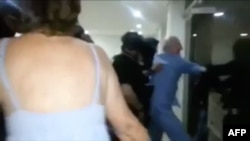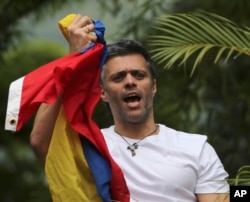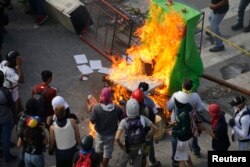U.S. President Donald Trump says he is holding Venezuelan President Nicolas Maduro "personally responsible" for the health and safety of two opposition leaders seized by police in the middle of the night.
"The United States condemns the actions of the Maduro dictatorship," Trump said in a statement late Tuesday. "Mr. Lopez and Mr. Ledzema are political prisoners being held illegally by the regime... we reiterate our call for the immediate and unconditional release of all political prisoners."
WATCH: VP Mike Pence condemns Venezuela's actions
Twitter video shows intelligence agents dragging Leopoldo Lopez and Antonio Ledezma out of their homes and shoving them into cars. Ledezma was still in his pajamas.
The two were under house arrest for previous opposition activities. The Venezuelan Supreme Court says "official intelligence sources" warned that Lopez and Ledezma were planning to flee. The court said they broke the terms of their house arrest by "political campaigning" and "making statements to the media," encouraging protests against the Maduro government.
Lopez's lawyer, Juan Carlos Gutierrez, denied his client violated his house-arrest regulations. He said Lopez was only forbidden from talking about his own case.
Lopez supporters released a video shot last week, showing him rubbing his pregnant wife's belly and saying he would likely be arrested again.
White House spokeswoman Sarah Huckabee Sanders called the arrests "unjust" and said they follow Maduro's "outrageous seizure of power through a sham election" — a reference to Sunday's vote for an assembly to rewrite the constitution, which is opposed by 70 percent of Venezuelans.
U.S. Secretary of State Rex Tillerson called the opposition leaders' arrests "very alarming." The two men each had posted videos urging their followers to boycott Sunday's election.
Lopez and Ledezma, both former mayors, were under house arrest for various charges. Lopez previously spent three years in jail on charges of instigating violence during anti-Maduro street protests in 2014; Ledezma was convicted in 2015 on charges of plotting a coup against Maduro.
Sanctions against Venezuela
The U.S. imposed sanctions Monday against Maduro for what it called his "illegitimate" election of an assembly to rewrite the constitution. All of Maduro's assets in the U.S. have been frozen and Americans are forbidden from doing any business with him.
Maduro says he does not care. He raged on Venezuelan television: "They don't intimidate me. The threats and sanctions of the empire don't intimidate me for a moment. ... Bring on more sanctions, Donald Trump."
Defense Minister Vladimir Padrino dismissed U.S. charges that Maduro is a dictator. He said dictators do not hold elections, invoke the constitution and work for peace to avoid civil war.
Jennifer McCoy, a distinguished professor at Georgia State University and former director of the Carter Center's Americas program, said some legislators who are members of Maduro's party have distanced themselves as a critique of Sunday's vote and the government's actions.
"There have been some other defections from former Chavistas who are also critical of what the government has been doing," McCoy told VOA. "If a group of dissident Chavistas grows, that provides sort of a third or a middle ground. If they united with the opposition, then that isolates the government further along with the international isolation that seems to be growing. With those two tendencies we may see eventually a willingness for real talks to begin."
McCoy also said that so far the Venezuelan military has supported Maduro.
The Maduro government is determined to form the 545-member constituent assembly.
The government said more than 8 million people cast ballots; the opposition, which boycotted the vote, said the turnout was much lower. Reporters on the ground in Caracas said dozens of polling places were almost deserted Sunday.
If 8 million people did cast ballots, that would be less than half of all registered voters. Pre-election polls showed more than 70 percent of all Venezuelans opposed the assembly.
Details on what might be included in a new constitution are unclear. Maduro has said it is the only way to pull Venezuela out of its severe economic and social crisis and curtail political violence.
The opposition contended the vote was rigged in order to pack the assembly with Maduro supporters who could dissolve the opposition-controlled national assembly, and fire officials who disagree with the government. Maduro's opponents are demanding early presidential elections.
Violence, corruption
Violence and protests for and against the election killed at least 10 people, bringing the total number of deaths in four months of anti-government protests to more than 120.
The drop in global energy prices and political corruption have destroyed Venezuela's oil-rich economy. Gasoline, medicine and such basic staples as cooking oil, flour, and sugar are scarce, and many Venezuelans cross into neighboring Colombia and Brazil to buy food.
Maduro has blamed the country's woes on what he calls U.S. imperialism and its supporters inside Venezuela. He has warned against intervention by the Organization of American States, saying that would surely lead to civil war.
A spokesman for United Nations Secretary-General Antonio Guterres says the U.N. chief is urging Venezuelans, particularly their leaders, to make all possible efforts to de-escalate tensions, saying the "only way forward is a political solution."
VOA's Alvaro Algarra in Caracas contributed to this story.











